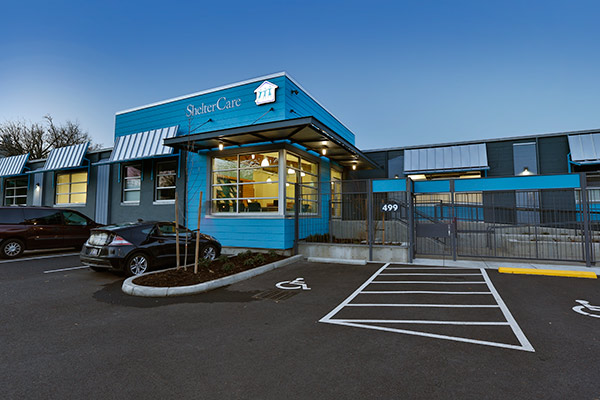ShelterCare is a private, nonprofit human services agency addressing homelessness in our area. They offer a range of housing solutions, combined with wraparound services for vulnerable community members who are homeless or on the verge of homelessness. Their programs help people keep their current housing or recover lost housing. Then they work with clients to build the skills necessary to stabilize their housing.
Sheltercare started on Christmas Eve, 1970 as a temporary program in the old “Animal House”. The founder of ShelterCare came up with a model that is used throughout the nation now, which relies on clients who have been helped to mentor others.
The current office is located on West 4th behind REI, looking out on Washington Jefferson park. There are five programs and 140 employees. Here are some statistics for Lane County: over 1000 people are served each year; 13,000 at any given time are experiencing some type of homelessness. 85% will emerge out of homelessness. Mental illness and addiction are the most frequent reasons for homelessness, but mental illness is by far the biggest reason. 2400 children are now experiencing homelessness including 400 high school students. 70% of homeless high school students drop out.
ShelterCare Programs Include:
- Uhlhorn, named after an individual by that name who died much too young. It is targeted toward severe brain damage (physical) who are also homeless. There are 40 beds. 10% are filled by those who had long-boarding accidents.
- Garden Place, located next to Garden Way. It is a 24-hour lock-down facility that works with homeless who have mental illness. It’s a 6 month program designed to help folks to transition in to non-lock-down facilities.
- Homeless Prevention, mostly for families who are about to become homeless because of being behind on utility bills or rent. There is a lot of need and never enough funding.
- Medical Respite is for homeless who have an operation or severe medical procedure, so they can recover without a $3000/night hospital charge. ShelterCare staff try to find respite clients a permanent residence and help beyond respite.
- Supported Housing is for chronically homeless with some degree of mental illness.
ShelterCare believes in Housing First as a social and medical determinant. First, provide shelter and then help them with other services. ShelterCare dramatically reduces the overall cost for those with chronic homelessness.
There is a waiting list of 500 for ShelterCare supported housing. Some, however, are on the waiting list because they refuse support services.


